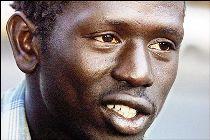Sudanese ‘lost boy’ hits the rap charts in Kenya
NAIROBI, Feb 25 (AFP) — Twelve years ago as a starving child soldier in war-torn Sudan, Emmanuel Jal contemplated suicide and cannibalism. These days, he basks in local celebrity as rap artist who has hit the Kenyan charts.
 |
|
Twelve years ago as a starving child soldier in war-torn Sudan, Emmanuel Jal, seen here in Nairobi, contemplated suicide and cannibalism, but these days, he basks in local celebrity as rap artist who has hit the Kenyan charts. (AFP). |
Conscripted into the rebel Sudanese People’s Liberation Army (SPLA) at the age of eight to fight in a civil war that spanned two decades, Jal spent four years fighting in the bush in southern Sudan, looking down the barrel of a gun.
Now, he recounts his desperate life and sings the praises of the Lord he says delivered him from death in a hit single “Gua,” an impassioned appeal for peace and tranquillity to be restored in Sudan.
“My music is my lifestyle, what I have experienced,” he told AFP in between visits to a Nairobi recording studio. “I am appreciating who has helped me.”
Music, he says, has helped him forget his tumultuous past and healed his soul.
Jal has struck a chord in Kenya which is home to many Sudanese refugees and played a critical role in brokering the January peace deal between Khartoum and the SPLA that ended Africa’s longest-running civil war.
“The song has been received extremely well by our listeners,” said Arthur Kamau, producer of the “Stomp” music program on Kenya’s Nation television. “It was voted the song of the week.”
The lyrics, which Jal raps in English and a Sudanese dialect, are a plea for an end to a conflict in which he himself was an unwilling participant in for four years.
“Our God, we will praise, Oh my God, I can’t wait for the day when my people will be free in the land, I can’t wait,” he chants.
“I can’t wait for that day for when I’ll see no more fears, no more tears, no cry, no tribalism, no racism in my motherland when my people go back home to their motherland Sudan.”
His passion is clear when he describes the horror of his time as a child soldier and later as one of several thousand of the so-called “lost boys” of Sudan who wandered aimlessly after escaping from their forced military service.
“I escaped from the frontline and in between I experienced occasions where there was no water, people were dying and other soldiers were frustrated and took the guns and shoot themselves,” Jal said.
As frustration mounted, the lost boys literally looked death in the eye as the only way to survive was to eat their dead compatriots or kill scavenging animals who were more willing to tear their bodies apart, he said.
When it became unbearable, they resigned themselves to an obvious fate: death and perhaps becoming a meal themselves.
“It came a point where most of us gathered on a tree and we all waited to die,” Jal said. “At one point I was tempted to eat (human) flesh because we had nothing to eat.”
“A friend of mine died and we put
landmines around him so that when hyenas would come, they would explode and kill the hyenas, but the hyenas were so fast that they took the body before the mines could explode,” he said.
In the end, Jal and some of his surviving friends were lucky: they were rescued by villagers who heard them attempting to hunt birds and later smuggled into Kenya in 1993.
In Nairobi, after toying with ambitions to become an engineer, Jal embarked on a music career in 2000 with benefit performances to raise money for street children and recorded his first album last year.
He mixes several genres to pass a message of peace and hope as well as to promote the education of girls in Sudan, but his latest rap tune “Gua” is the reason for his recent fame.
